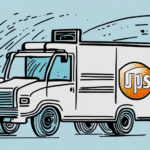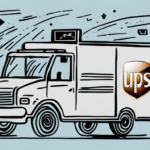Preparing an International Import Air Waybill for UPS Worldwide Express Freight
When planning to send your shipment abroad, preparing an international air waybill is essential. This critical document serves as a legally binding contract between the shipper, carrier, and consignee, outlining the shipment's details. For international shipping with UPS Worldwide Express Freight, an air waybill is mandatory for every shipment to ensure timely and accurate delivery. In this article, we will explore the significance of an air waybill, the fundamentals of preparing an import air waybill, and share best practices for a successful international shipment.
Understanding the Importance of an Air Waybill for International Shipping
An air waybill is a document that accompanies your shipment from the point of origin to the final destination. It contains all the necessary information for customs clearance, billing, and transportation of the shipment. The air waybill also serves as a contract between the shipper, carrier, and consigner, outlining the terms of the shipment.
One of the key benefits of using an air waybill for international shipping is that it provides a clear and concise record of the shipment's journey. This detailed record is invaluable in the event of disputes or issues that may arise during transit. By having a comprehensive account of the shipment's movements, it becomes easier to identify and address any problems promptly.
Furthermore, the air waybill ensures compliance with international regulations. It includes all the necessary details required by customs authorities, such as the nature of the goods, their value, and applicable taxes or duties. By furnishing this information upfront, the air waybill streamlines the customs clearance process, reducing the risk of delays or additional charges. According to the Statista Air Cargo Market Report, the global air cargo market was valued at over $130 billion in 2022, highlighting the critical role of accurate documentation in facilitating international trade.
The Basics of Preparing an Import Air Waybill for UPS Worldwide Express Freight
To prepare an import air waybill for UPS Worldwide Express Freight, follow these essential steps:
- Select the appropriate type of air waybill for your shipment.
- Accurately fill out the required information, including shipper and consignee details.
- Provide detailed information about the shipment, such as the number of packages, weight, and dimensions.
- Include all necessary customs documentation, such as commercial invoices and certificates of origin.
For UPS Worldwide Express Freight, the recommended air waybill type is the international standard air waybill, which can be downloaded from the UPS website.
Choosing the Right Type of Air Waybill for Your Shipment
The type of air waybill you choose depends on your shipment's nature, destination, and the carrier used. For international shipments with UPS Worldwide Express Freight, the international standard air waybill is recommended. This document serves as a comprehensive contract between the shipper, carrier, and consignee, containing all essential information for customs clearance, billing, and transportation.
Alternatively, if you are shipping domestically within the United States, a domestic air waybill may be more appropriate. This type is specifically designed for shipments within the country and includes all necessary information for domestic transportation and billing.
Incorrect selection of the air waybill type can lead to delays or rejection of the shipment by customs officials. Therefore, it is crucial to choose the appropriate document type based on your shipment's requirements. For detailed guidance, refer to the UPS Shipping Solutions.
Filling Out the Required Information on the Air Waybill
Accurate completion of the air waybill is paramount to avoid shipment delays or additional fees. Ensure the following information is correctly filled out:
- Shipper and Consignee Details: Full names, addresses, telephone numbers, and email addresses.
- Shipment Details: Number of packages, total weight, dimensions, and type of goods.
- Declared Value: Accurate valuation for customs purposes.
- Special Instructions: Any handling requirements or hazardous materials information.
Missing or incorrect information can result in customs delays or even shipment rejection. Additionally, some countries may have specific requirements for air waybills, so it's advisable to consult with customs experts or the carrier to ensure compliance.
According to ICAO, accurate air waybill documentation is critical for maintaining global air freight security and efficiency.
Understanding Customs Regulations and Documentation
International shipments must adhere to various customs regulations and documentation requirements, which can vary widely by country and type of goods. Key documents typically include:
- Commercial Invoice: Detailed description of the goods, their value, and terms of sale.
- Packing List: Itemized list of the contents, packaging details, and weight.
- Certificate of Origin: Verification of the goods' manufacturing origin.
- Import Permits: Required for certain restricted or regulated items.
Ensure that all documentation is accurate and complete to facilitate smooth customs clearance. UPS offers resources and support to help navigate these requirements effectively.
Additional resources, such as the World Trade Report, provide comprehensive insights into global trade regulations and compliance strategies.
Tips for Accurate and Timely Delivery of Your Shipment
To ensure your shipment is delivered accurately and on time, consider the following tips:
- Double-Check Information: Verify all details on the air waybill for accuracy.
- Understand Packaging Requirements: Use appropriate materials to protect goods during transit.
- Use UPS Express Options: Opt for expedited services for faster delivery times.
- Monitor Shipment Progress: Utilize UPS tracking capabilities to stay informed.
- Consult with Shipping Experts: Seek professional advice for complex shipments.
Proper packaging is integral to safeguarding your goods. Use sturdy boxes and suitable cushioning materials to prevent damage during transit. Clearly label your packages with accurate recipient and sender information, including contact details.
Implementing these best practices can significantly reduce the risk of delays and ensure a smooth shipping process. According to a UPS International Trade Statistics report, efficient documentation and packaging are key factors in ensuring timely delivery of international shipments.
Tracking Your Shipment with UPS Worldwide Express Freight
With UPS Worldwide Express Freight, tracking your shipment is straightforward and provides real-time visibility. Upon completing your air waybill, you'll receive a tracking number that can be used on the UPS tracking website to monitor your shipment's progress.
This tracking system offers insights into the shipment's location, expected delivery date, and any potential delays. Additionally, UPS Worldwide Express Freight provides proactive notifications via email or text messages, keeping you informed at every stage of the shipping process. This feature enhances peace of mind and allows for timely responses to any unforeseen issues.
Common Issues and Solutions When Preparing an International Import Air Waybill
When preparing an international import air waybill, several common issues may arise, including:
- Incorrect or Incomplete Information: Leads to delays or shipment rejection.
- Inadequate Packaging: Causes damage to goods during transit.
- Non-Compliance with Customs Regulations: Results in fines or shipment holds.
- Poor Labeling: Causes misrouting or delays in delivery.
Solutions to these issues include:
- Ensure Accuracy: Double-check all air waybill details to prevent errors.
- Use Quality Packaging: Select appropriate packaging materials to protect shipments.
- Consult with Experts: Seek assistance from shipping professionals for compliance with customs requirements.
- Proper Labeling: Label packages clearly with accurate shipping and customs information.
Additionally, consider the mode of transportation and its specific requirements. Different carriers and countries may have unique regulations, such as weight restrictions or packaging standards, which must be adhered to for successful shipment. Leveraging UPS shipping experts can provide valuable guidance in navigating these complexities.
Comparison with Other Shipping Options for International Imports
When evaluating UPS Worldwide Express Freight against other international shipping options, consider the following factors:
- Delivery Speed: UPS Worldwide Express Freight offers expedited delivery times compared to standard shipping services.
- Reliability: UPS is renowned for its reliability and extensive global network, ensuring consistent delivery performance.
- Competitive Pricing: UPS provides competitive rates, especially for high-volume shipments.
- Customs Assistance: UPS offers comprehensive support with customs documentation, reducing the likelihood of shipment delays.
- Tracking and Visibility: Full tracking capabilities allow for real-time monitoring of shipments.
- Customer Service: UPS provides 24/7 customer support, aiding in resolving any issues promptly.
Moreover, UPS Worldwide Express Freight offers a range of additional services, such as:
- Pickup and Delivery Options: Flexible schedules to accommodate various shipping needs.
- Packaging and Labeling Assistance: Professional support to ensure shipments meet all requirements.
- Temperature-Controlled Shipping: Essential for sensitive or perishable items, ensuring they remain in optimal condition during transit.
These features collectively make UPS Worldwide Express Freight a robust choice for international imports, providing a balance of speed, reliability, and comprehensive support services.
Best Practices for Successful International Shipping with UPS Worldwide Express Freight
To maximize the success of your international shipments with UPS Worldwide Express Freight, implement the following best practices:
- Select the appropriate air waybill based on shipment type and destination.
- Accurately and completely fill out all required air waybill information.
- Ensure compliance with all relevant customs regulations and documentation requirements.
- Use suitable packaging materials to protect goods during transit.
- Opt for UPS Express freight options for expedited and reliable delivery.
- Monitor your shipment's progress using UPS tracking tools.
- Consult with shipping experts to address any questions or issues.
Additionally, properly labeling your packages is critical. Ensure that all labels are clear, accurate, and legible, containing essential shipping information and any necessary customs declarations. This practice helps prevent misdelivery and facilitates smooth customs processing.
Understanding the specific requirements of your destination country is also vital. Each country may have unique regulations and restrictions on certain goods, so thorough research and compliance are necessary to avoid shipping delays or legal complications. Leveraging UPS's comprehensive resources and expert support can aid in navigating these country-specific requirements effectively.
Conclusion
Preparing an international air waybill for UPS Worldwide Express Freight is a crucial step in ensuring the accurate and timely delivery of your shipments. By adhering to the best practices outlined in this article, you can achieve compliance with all necessary regulations and documentation, safeguard your goods during transit, and benefit from full visibility and tracking throughout the shipping process. Implementing these strategies will contribute to a reliable and efficient international shipping experience.






















